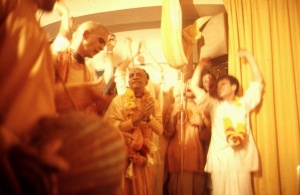CC Antya 5.102 (1975)

A.C. Bhaktivedanta Swami Prabhupada
TEXT 102
- 'yadvā-tadvā' kavira vākye haya 'rasābhāsa'
- siddhānta-viruddha śunite nā haya ullāsa
SYNONYMS
yadvā-tadvā kavira—of any so-called poet; vākye—in the words; haya—there is; rasa-ābhāsa—overlapping of transcendental mellows; siddhānta-viruddha—against the conclusive understanding; śunite—to hear; nā—not; haya—there is; ullāsa—joy.
TRANSLATION
"In the writings of so-called poets there is generally a possibility of overlapping transcendental mellows. When the mellows thus go against the conclusive understanding, no one likes to hear such poetry.
PURPORT
Yadvā-tadvā kavi refers to anyone who writes poetry without knowledge of how to do so. Writing poetry, especially poetry concerning the Vaiṣṇava conclusion, is very difficult. If one writes poetry without proper knowledge, there is every possibility that the mellows will overlap. When this occurs, no learned or advanced Vaiṣṇava will like to hear it.